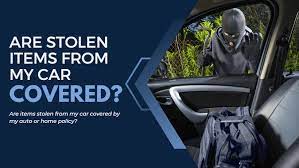Introduction
Car insurance is a crucial financial safeguard for vehicle owners, providing coverage for accidents, damage, and theft. However, many car owners wonder whether their insurance policies extend to covering items stolen from their vehicles. In this comprehensive guide, we will delve into the topic of whether car insurance will cover stolen items, offering insights, tips, and expert advice to help you understand this complex issue.
Understanding Car Insurance
What Does Standard Car Insurance Cover?
Most standard car insurance policies primarily focus on protecting the vehicle itself and its occupants. They typically provide coverage for:
1. Collision Coverage
This aspect of insurance covers damage to your vehicle resulting from accidents with other cars or objects.
2. Comprehensive Coverage
Comprehensive coverage handles non-collision-related incidents, including theft, vandalism, and natural disasters.
3. Liability Coverage
Liability insurance is designed to cover medical expenses and property damage for other parties involved in an accident where you are at fault.
What Doesn’t Standard Car Insurance Cover?
While car insurance offers extensive protection, it’s essential to recognize its limitations. Standard car insurance typically does not cover:
1. Personal Belongings
The majority of car insurance policies do not include coverage for personal items stolen from your vehicle. If your laptop, phone, or other valuables are stolen, your car insurance might not reimburse you.
Additional Coverage Options
2. Personal Property Coverage
Some insurance companies offer an add-on known as “personal property coverage.” This option can be purchased separately to protect personal items within your car. It may include coverage for items like electronics, clothing, or sporting equipment.
3. Homeowners or Renters Insurance
If your personal items are stolen from your vehicle, your homeowners or renters insurance might provide coverage. It’s essential to check your policy or discuss the specifics with your insurance provider.
Filing a Claim
4. Reporting the Theft
If your personal items are stolen from your car, you must report the theft to the police and your insurance provider as soon as possible. This documentation will be essential when filing a claim.
5. Providing Evidence
To support your claim, you will need to provide evidence of the stolen items, such as receipts, photographs, or any other relevant documents.
Tips for Protecting Your Belongings
While car insurance may not always cover stolen items, you can take proactive measures to protect your belongings:
6. Don’t Leave Valuables in Plain Sight
One of the simplest ways to prevent theft is to avoid leaving valuable items in plain sight within your vehicle. Stow them in the trunk or use a concealed compartment if possible.
7. Use Anti-Theft Devices
Consider investing in anti-theft devices such as steering wheel locks or car alarms. These can deter thieves and potentially lower your insurance premiums.
8. Park in Safe Areas
When parking your vehicle, choose well-lit and secure areas. Public parking lots, especially those with surveillance cameras, can be safer than dimly lit streets.
9. Install Window Tinting
Window tinting can obscure the view into your vehicle, making it less enticing for thieves to break in.
10. Purchase a Car Safe
Car safes are secure lockboxes that can be mounted within your vehicle, providing a safe storage option for valuable items.
Additional Considerations
11. Review Your Policy
It’s crucial to thoroughly review your car insurance policy to understand what it covers and what it doesn’t. If you have questions, don’t hesitate to reach out to your insurance provider for clarification.
12. Document Your Belongings
Keeping a detailed inventory of the items you carry in your vehicle can be helpful in case of theft. Include serial numbers, purchase receipts, and photographs when possible.
13. Consider Rideshare Insurance
If you frequently use rideshare services like Uber or Lyft, consider rideshare insurance options. These policies can provide additional coverage for personal items while you’re using the service.
